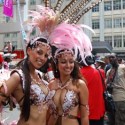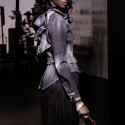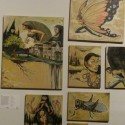Changing the Face of Broadway
Rachael-Lea Rickards wanted to play Rizzo in her high school production of Grease. She auditioned for the part, but didn’t get the role. When it came to acting, singing and dancing, being one of the most talented students in her school wasn’t enough.
Talent wasn’t the issue — appearance was. In her own words, Rickards says of herself that, “I was a chubby child, but today I celebrate my curves.” And her theatrical aspirations conflicted with the expected common type of the discipline. “It was really difficult auditioning for roles, as a woman of colour.”
Her persistence led her to be a part of the collective formation of the Fringe Festival hit ‘da Kink in my Hair, its Princess of Wales box-office blowout (the first Canadian production to grace that stage) and a writer on the Global Television series of ‘da Kink.
After some years with ‘da Kink, co-writing “I am NOT a Dinner Mint” with Trey Anthony, and co-producing at Kinky Dinner Productions, a full-circle moment came about that put a lot of Rickards’ past into perspective.
“While writing for television in the second season of ‘da Kink, a friend invited me to see her little daughter perform in a production. We ended up doing some work with that company, then I ended up co-directing Grease — the same production that I wanted to be in when I was in high school.”
All of those moments of wanting to be a dancer, desiring to pursue the arts, and not getting the part of Rizzo were revived. “So when we did this production,” she explains, “we really wanted to make sure that children were selected, not based on what they looked like, but by what they brought to the table.”
By the end of that production, Rickards was inspired with a vision to found the Broadway Bound Theatre Academy. The purpose of the school, Rickards says, “is to create a first-class academy for our children through an intense program of dance, music and script.”
The tagline of the academy, which opened its doors in March of this year, is “Changing the Face of Broadway.”
There are layers of meaning behind that statement. Rickards elaborates: “What I can tell you is, growing up, the face of Broadway looked nothing like me. I didn’t see black women, unless of course the character called for it. I didn’t see normal bodies on stage. Today, I still see a lot of the same. Thin, mostly Caucasian women and men on stage.
From my own personal experience, and from producing shows that celebrate ‘real people,’ audiences enjoy seeing themselves reflected on stage. Why do you think we all loved Jennifer Hudson so much? Because she was a woman who didn’t fit the mould, but surpassed expectations and limitations. Broadway needs to encompass us all. It’s way overdue.”
Although she knows it will be a huge task, Rickards is determined to change the face of Broadway, in the same way that ‘da Kink has changed and diversified Toronto theatre.
“Do I believe that it will be easy? As my parents say, ‘nothing worth doing well is easy, or everyone would be doing it.’ It’s going to take work. But when parents start supporting their children in the arts, believing that they can change the face of Broadway, Hollywood and even our Toronto stages right here, it is then that we will also start to see a huge change in direction.”







Leave your response!